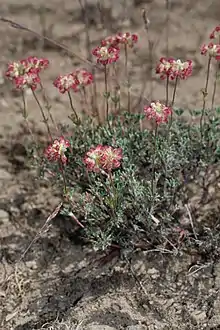Eriogonum thymoides
Eriogonum thymoides is an "abundant"[1] species of flowering plant in the buckwheat family known by the common name thymeleaf wild buckwheat, or simply thymeleaf buckwheat.
| Eriogonum thymoides | |
|---|---|
 | |
| Scientific classification | |
| Kingdom: | Plantae |
| Clade: | Tracheophytes |
| Clade: | Angiosperms |
| Clade: | Eudicots |
| Order: | Caryophyllales |
| Family: | Polygonaceae |
| Genus: | Eriogonum |
| Species: | E. thymoides |
| Binomial name | |
| Eriogonum thymoides | |
It is native to Idaho, Oregon, and Washington in the Pacific Northwest of the United States, where there are three main population groups.[2] It flowers in mid-spring.[3]
This plant grows in sagebrush, ponderosa pine forest openings, and mountain ridges.[1]
This is a subshrub up to 30 by 40 centimetres (12 by 16 in) wide and covered in woolly or silky hairs. The hairy leaves are linear to spatulate and flat or rolled, and measure up to 1.5 cm in length. It produces erect flowering stems up to about 12 centimeters tall. Each stem has a whorl of small bracts around the middle. Atop the short stem[3] is a headlike inflorescence up to 2 cm wide. The flower is up to 1 cm long and white to yellow to pink or red in color.[3] The petals and sepals are covered by long hairs.[3] The species is polygamodioecious, meaning that some of the plants have both male and bisexual flowers, while others have both female and bisexual flowers.[2]
According to one source, this plant has "special value to native bees."[4]
References
- Eriogonum thymoides. Washington Burke Museum.
- Eriogonum thymoides. Flora of North America.
- Taylor, Ronald J. (1994) [1992]. Sagebrush Country: A Wildflower Sanctuary (rev. ed.). Missoula, MT: Mountain Press Pub. Co. p. 32. ISBN 0-87842-280-3. OCLC 25708726.
- Eriogonum thymoides. Lady Bird Johnson Wildflower Center.
External links
| Wikimedia Commons has media related to Eriogonum thymoides. |
| Wikispecies has information related to Eriogonum thymoides. |